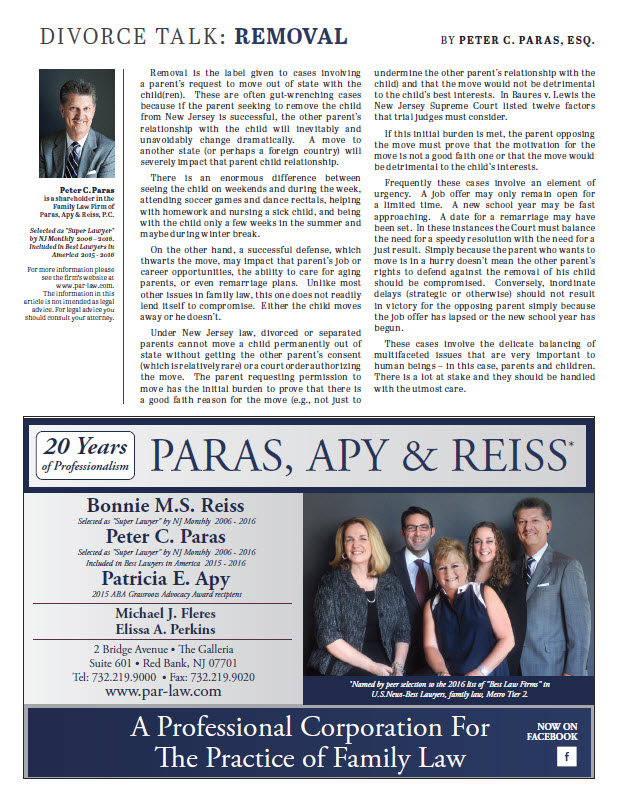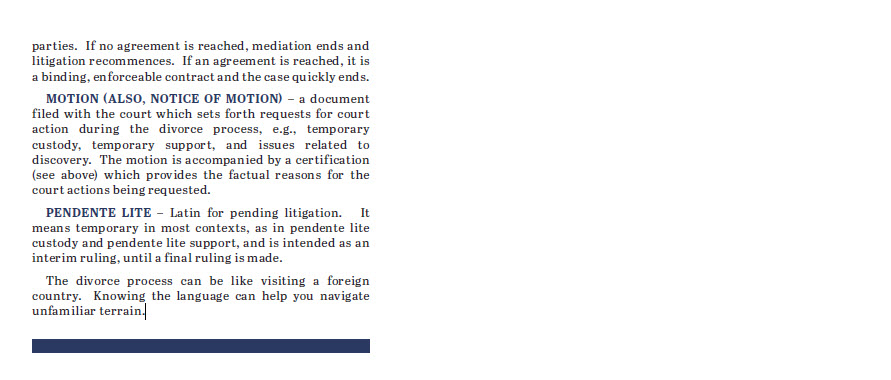Divorce is a process which, predictably, has its own language. Most people entering the process for the first time are unfamiliar with the language of divorce. Here is a glossary of some of the most common terms.
ARBITRATION – a hearing in which a neutral person (typically an attorney or a retired judge) selected by the parties’ attorneys, hears the case and renders a binding decision. Arbitration is voluntary, but once there is agreement to arbitrate, the result is binding.
CASE INFORMATION STATEMENT (CIS) – a financial disclosure form that must be filed with the Court by both parties. It includes biographical data, income information, a list of monthly living expenses, and a balance sheet of assets and liabilities.
CASE MANAGEMENT CONFERENCE – a conference between the judge and the attorneys at which various time frames for accomplishing preliminary work are set. These time frames are then memorialized in a Case Management Order signed by the judge.
CERTIFICATION – this is a document like an affidavit. It sets forth a factual narrative on which a motion (see below) is based. It is signed by the party
who made the certification and contains an oath that the contents are true.
COMPLAINT – this is the first document filed in a divorce case. It contains the grounds for divorce and the requests for relief being sought, such as custody, child support, alimony and/or equitable distribution. The other party can file an Answer and Counterclaim in which he/she sets forth similar information and requests.
DISCOVERY – this is the general term for the various vehicles for obtaining information from the other party, such as interrogatories, depositions, and expert evaluations. parties. If no agreement is reached, mediation ends and litigation recommences. If an agreement is reached, it is a binding, enforceable contract and the case quickly ends.
MOTION (ALSO, NOTICE OF MOTION) – a document filed with the court which sets forth requests for court action during the divorce process, e.g., temporary custody, temporary support, and issues related to discovery. The motion is accompanied by a certification (see above) which provides the factual reasons for the court actions being requested.
PENDENTE LITE – Latin for pending litigation. It means temporary in most contexts, as in pendente lite custody and pendente lite support, and is intended as an interim ruling, until a final ruling is made. The divorce process can be like visiting a foreign country. Knowing the language can help you navigate
unfamiliar terrain.
EARLY SETTLEMENT PANEL (ESP) – a court required settlement opportunity in which volunteer family lawyers meet with the parties and their attorneys in an effort to help fashion a settlement.
MEDIATION – a process in which a neutral third party, selected by the parties and their attorneys, tries to help them reach an agreement on all issues in dispute. A successful mediation will culminate in a formal written agreement that is signed by both.


